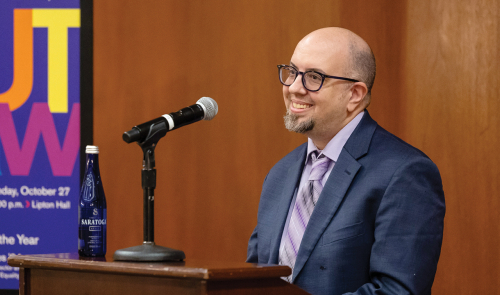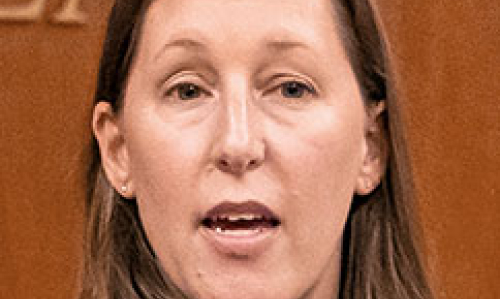OUTLaw Alum of the Year Gabriel Arkles ’04 considers history and future of transgender rights

Gabriel Arkles ’04, co-interim legal director and litigation director of Advocates for Trans Equality (A4TE), received the OUTLaw Alum of the Year Award at an alumni reception on October 27. OUTLaw, the NYU Law student group that brings together self-identifying LGBTQ+ students, alumni, faculty, and staff, and their allies, honored Arkles for his longstanding advocacy in pursuit of LGBTQ+ equality, evident in his two decades of committed legal activism.
Arkles began his career as a staff attorney and director of prison justice initiatives at the Sylvia Rivera Law Project before serving as an acting assistant professor of lawyering at NYU Law from 2010 to 2013. He then taught in Northeastern University School of Law’s Legal Skills in Social Context program. Subsequently, Arkles was a senior staff attorney with the American Civil Liberties Union’s LGBT and HIV Project before joining the Transgender Legal Defense & Education Fund, now A4TE, as senior counsel in 2020.
Arkles helped achieve victory in the US Supreme Court case Bostock v. Clayton County, which established that federal law prohibits anti-transgender discrimination. He has also challenged an anti-trans ballot initiative and anti-trans laws and policies, worked to reform prison conditions for incarcerated transgender people, and fought the criminalization of HIV, such as harsher criminal punishments levied against people with HIV than others convicted of the same crime would receive. Arkles’s scholarship on gender, race, and disability has appeared in many publications, including the NYU Law Review, the NYU Review of Law & Social Change, Southwestern Law Review, and the Advocate. He is co-founder of the Alyssa Rodriguez Center for Gender Justice, a grassroots organization combating gender-based violence in the prison system.
Addressing the gathering, Arkles reflected on the fraught state of LGBTQ+ and particularly transgender rights. He mentioned diminished access to hormones and gender-affirming care, barriers to obtaining official identification or using a restroom reflecting one’s gender identity, and the Trump administration’s instruction to the Department of Housing and Urban Development to restrict trans and non-binary individuals’ access to homeless and domestic violence shelters.
“Government officials at a range of places and a range of levels, including at the very highest level, are saying that trans people do not exist,” and they claim that saying otherwise is deceitful and even a form of terrorism, Arkles said. “I just didn’t think there would be enough political will to criminalize health care for kids, even if they are trans,” he added. “I was very wrong.”
Arkles recalled the aftermath of 9/11, which occurred during his first semester at NYU Law, and the government’s portrayal of Muslims as dangerous. “I do have this sort of stubborn faith in our government and our institutions that is not actually borne out by history,” he said. “But I also look to history for hope, because the reason why things haven’t been worse than they are…is because people have been taking care of each other.”
Regarding history, Arkles invoked the names of activists such as Frances Thompson, who in 1866 became the first known trans woman to testify before Congress; Maude Milbourne, who became the first known trans elected official in the US in 1885; and Pauli Murray, a transgender man whose work was influential in the civil rights and gender equality movements of the 20th century. The courage displayed in the past, Arkles suggested, carries forward to the present.
“At A4TE, we are bringing this history to the Supreme Court,” he said. “We’re trying to get them to pay attention.” These efforts, Arkles added, continue even as law firms hesitate to support LGBTQ+ rights litigation openly or to partner on a case against the Trump administration for fear of retaliation.
“People doing the work, whether they put their names on the papers or not, it still really makes a difference,” he said. “And while it’s a time when I want people to have courage, it’s also a time when I want people to find whatever way they can, big or small, public or private…to protect…everyone who is being hurt in this moment.”



